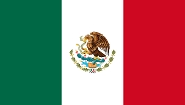Government/Policy

November 29, 2018
Mexico Considering Retaliatory Steel & Aluminum Tariffs
Written by Sandy Williams
Tariffs on U.S. steel and aluminum exports to Mexico may be coming if the Trump administration does not drop its Section 232 tariffs on Mexican imports, says Mexican steel association Canacero.
“They already agreed, this government and the incoming one, that we will apply resounding mirror measures,” Canacero Vice President Raul Gutierrez said at a news conference Tuesday at the Institute for Industrial Development and Economic Growth (IDIC).
Canacero stated in a letter to the current and incoming administration earlier this month that it was “not feasible to have a new agreement such as the USMCA, which seeks to promote regional integration and at the same time limit trade in key sectors for Mexico.”
The letter continued, “When markets are attacked, inevitably it ends up eliminating the generation of value of regional integration.”
Mexico’s new government under Andres Manuel Lopez Obrador demands tariffs be lifted before Mexico will sign the U.S.-Mexico-Canada Agreement.
Officials from the U.S. and Mexico have been working on a deal that would substitute quotas for the tariffs. Mexico advocates a quota of 130 to 150 percent of the country’s average exports from 2015 to 2017. The U.S., however, is reportedly seeking a quota below Mexico’s current export level.
Sen. Rob Portman (R-OH), a member of the Senate Finance Committee and a former U.S. Trade Representative, cast doubt on the USMCA signing that is expected to take place at the G20 summit in Buenos Aires, Argentina.
“I think in the next few days we’re going to find out how that gets resolved because my sense is that Mexico might not sign the agreement at the end of this week unless there’s some resolution on steel and aluminum, at least as to Mexico,” said Portman in remarks at the Hudson Institute on Wednesday.
Even if Canada and Mexico sign the agreement, it will still need to be ratified by Congress, which may not occur until next year when the Democrats take over the House. Implementing the legislation will be challenging, but will have bipartisan support, said Portman.
“I think we can get it done,” he said. “Some, as you know, push to get it done quicker — including me — but that’s not likely.”







